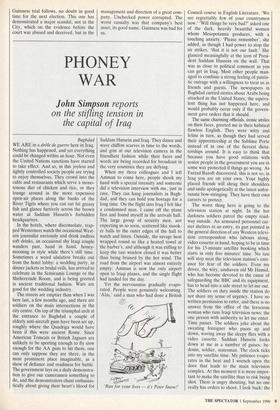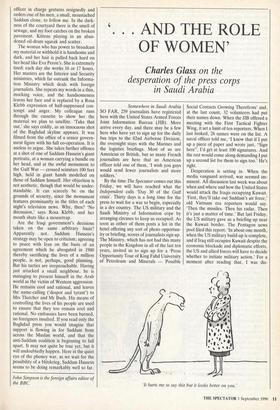PHONEY WAR
John Simpson reports on the stifling tension in the capital of Iraq
Baghdad
WE ARE in a drole de guerre here in Iraq. Nothing has happened, and yet everything could be changed within an hour. Not even the United Nations sanctions have started to take effect. And so, in this joyless and tightly controlled society people are trying to enjoy themselves. They crowd into the cafés and restaurants which serve a mono- tonous diet of chicken and rice, or they
lounge around in the more expensive open-air places along the banks of the River Tigris where you can eat fat greasy fish and glance furtively across the brown water at Saddam Hussein's forbidden headquarters.
In the hotels, where disconsolate, trap- ped Westerners watch the occasional West- ern journalist enviously and drink endless soft drinks, an occasional shy Iraqi couple wanders past, hand in hand, honey- mooning in style while there's still time. Sometimes a weird ululation breaks out from the hotel lobby: a wedding party, in dinner jackets or bridal veils, has arrived to celebrate in the Semiramis Lounge or the Sheherezade Room, and is being greeted in ancient traditional fashion. Wars are good for the wedding industry.
The streets are emptier than when I was here last, a few months ago, and there are soldiers on the main intersections in the city centre. On top of the triumphal arch at the entrance to Baghdad a couple of elderly anti-aircraft guns have been set up, roughly where the Quadriga would have been if this were ancient Rome. Since American Tomcats or British Jaguars are unlikely to be sporting enough to fly slow enough for the AA guns to hit them, one can only suppose they are there, in the most prominent place imaginable, as a show of defiance and readiness for battle. The government lays on a daily demonstra- tion to give our cameramen something to do, and the demonstrators chant enthusias- tically about giving their heart's blood for Saddam Hussein and Iraq. They dance and wave chiffon scarves in time to the words, and grin at our television camera in the friendliest fashion while their faces and words are being recorded for broadcast in the very countries they are defying.
When my three colleagues and I left Amman to come here, people shook my hand with a special intensity and someone did a television interview with me, just in case. They can hang journalists in Bagh- dad, and they can hold you hostage for a long time. On the flight into Iraq I felt like a condemned man. I came off the plane first and found myself in the arrivals hall. The large group of security men, not expecting us so soon, scattered like snook- er balls to the outer edges of the hall to watch and listen. Outside, the savage heat wrapped round us like a heated towel at the barber's, and although it was stifling to keep the taxi window closed it was better than being braised by the hot wind. The road from the airport was almost entirely empty: Amman is now the only airport open to Iraqi planes, and the single flight had landed for the day.
Yet the nervousness gradually evapo- rated. People were genuinely welcoming. 'Alas,' said a man who had done a British 'Run for your lives — it's Peter Snow!' Council course in English Literature. 'We see regrettably few of your countrymen now.' Will things be very bad?' asked one
of the dark, heavily beautiful women whom Mesopotamia produces, with a
touching anxiety. 'Please remember', she added, as though I had power to stop the air strikes, 'that it is not our fault.' She glanced meaningfully at the icon of Presi- dent Saddam Hussein on the wall. That was as close to political comment as you can get in Iraq. Most other people man- aged to combine a strong feeling of patrio- tic outrage with a willingness to treat us as friends and guests. The newspapers in Baghdad carried stories about Arabs being attacked in the United States; the equiva- lent thing has not happened here, and would probably occur only if the govern- ment gave orders that it should.
The same charming officials, ironic smiles on their faces, greeted me in their habitual flawless English. They were witty and feline in turn, as though they had served their apprenticeship at the Sublime Porte instead of in one of the fiercest dicta- torships around. It is easy to think that because you have good relations with senior people in the government you are in some way protected if things go wrong. As Farzad Bazoft discovered, this is not so; in Iraq you are on your own. Your highly placed friends will shrug their shoulders and smile apologetically at the latest unfor- tunate bow-stringing. They have their own careers to protect.
The worst thing here is going to the television station at night. In the hot darkness soldiers patrol the empty road- way outside. An armoured personnel car- rier shelters in an entry, its gun pointed in the general direction of any Western televi- sion correspondent who labours along, video cassette in hand, hoping to be in time for his 15-minute satellite booking which starts in only five minutes' time. No taxi will stop near the television station's entr- ance for fear of the soldiers. Even my driver, the wiry, unshaven old Mr Hamid, who has become devoted to the cause of safeguarding the BBC and its equipment, has to head into a side street to let me out. The soldiers on duty inside the station do not share my sense of urgency. I have no written permission to enter, and there is no answer from the office of the ferocious woman who runs Iraqi television news: the one person with authority to let me enter. Time passes. The soldiers joke about the sweating foreigner who paces up and
down, waving away the sleepy flies with a video cassette. Saddam Hussein looks
down at me in a number of guises: Be- douin, soldier, statesman. The clock ticks into my satellite time. My patience evapo- rates in the heat and I wrench open the door that leads to the main television complex. At this moment it is more impor- tant to make the satellite than to risk being shot. There is angry shouting, but no one really has orders to shoot. I look back: the officer in charge gestures resignedly and orders one of his men, a small, moustached Saddam clone, to follow me. In the dark- ness of the courtyard there is the smell of sewage, and my foot catches on the broken pavement. Kittens playing in an aban- doned oil-drum squeak and scatter.
The woman who has power to broadcast my material or withhold it is handsome and dark, and her hair is pulled back hard on her head like Eva Peron's. She is extremely tired: each day she works 16 or 17 hours. Her masters are the Interior and Security ministries, which far outrank the Informa- tion Ministry which deals with foreign journalists. She repeats my words in a thin, mocking voice, and the handsomeness leaves her face and is replaced by a Rosa Klebb expression of half-suppressed con- tempt and anger. My colleague runs through the cassette to show her the material we plan to satellite. 'Take that out,' she says coldly, as an innocuous shot of the Baghdad skyline appears. It was filmed from the office of a senior govern- ment figure with his full co-operation. It is useless to argue. She takes further offence at a shot of one of Saddam Hussein's giant portraits, at a woman carrying a bundle on her head, and at the awful monument to the Gulf War — crossed scimitars 100 feet high, held in giant hands modelled on those of Saddam himself. Her objection is not aesthetic, though that would be under- standable. It can scarcely be on the grounds of security, since the monument features prominantly in the titles of each night's television news. Why, then? 'No discussion,' says Rosa Klebb, and her mouth shuts like a mousetrap.
Are the Iraqi government's decisions taken on the same arbitrary basis? Apparently not. Saddam Hussein's strategy may be open to criticism; agreeing to peace with Iran on the basis of an agreement which he abrogated in 1980 thereby sacrificing the lives of a million people, is not, perhaps, good planning. But his tactics are irreproachable. Having just attacked a small neighbour, he is managing to present himself in the Arab world as the victim of Western aggression. He remains cool and rational, and leaves the name-calling ('despot and tyrant') to Mrs Thatcher and Mr Bush. His means of controlling the lives of his people are used to ensure that they too remain cool and rational. No embassies have been burned, no foreigners insulted. If you read only the Baghdad press you would imagine that support is flowing in for Saddam from across the Muslim world, and that the anti-Saddam coalition is beginning to fall apart. It may not quite be true yet, but it will undoubtedly happen. Here in the quiet eye of the phoney war, as we wait for the possibility of a blitzkrieg, Saddam Hussein seems to be doing remarkably well so far.
John Simpson is the foreign affairs editor of the BBC.



















































 Previous page
Previous page